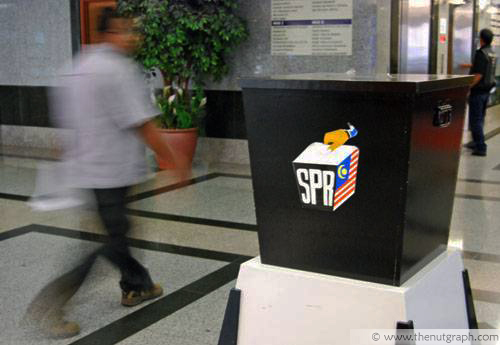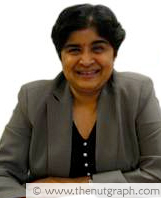
WHAT will it take for the Election Commission (EC) of Malaysia to be independent? Or at the very least, to be seen as trying to be independent even if it can’t really be so, according to the EC’s own explanation?
At a Bersih 2.0 public forum on 21 Feb 2011 in Petaling Jaya, what was made amply clear was that the EC could not bring about electoral reforms without the go-ahead from the federal government. Throughout the tough questioning from the floor, EC deputy chairperson Datuk Wira Wan Ahmad Wan Omar’s constant refrain was: “We can propose [reforms], but ultimately the government decides.”
His explanation that night could be translated into meaning: “The EC is trying. But unless the government says yes, we can’t do anything. That’s just the way the system is.”
For certain, the “embedded system”, as Wan Ahmad described it, does not ensure the EC’s independence in guaranteeing free and fair elections. Still, there are measures the EC can take to at least demonstrate that it is interested in playing an independent role.
Go back to the people
One such measure was proposed by a fellow panelist during the 21 Feb Bersih 2.0 forum. Political scientist and activist Wong Chin Huat, who is also Bersih steering committee member and resource person, suggested that there was at least one thing the EC could do to circumvent this “embedded system”.
Wong acknowledged that the lawmaking or changing process in Malaysia was dependent on the Attorney-General’s (AG’s) Chambers submitting proposals to the minister in charge, who would then propose it in Parliament to be passed. Indeed, as Wan Ahmad pointed out, the EC does not have the power to make laws.
Wong’s evaluation was, all was not lost. He suggested that the EC consult the people to gain public support for the legal reforms the EC wants passed in the interest of free and fair elections. “Let the AG reject the EC’s proposals then. We, the people, will then take the AG to task. And we know who the AG’s boss is – we can also change the boss.”
Wong, who is also a columnist with The Nut Graph, wasn’t the only one trying to lend support to the EC so that it could start adopting a more proactive stand in regaining its independence. “Is the EC willing to work with civil society? If the EC is willing to initiate reform, let us help you!” said someone from the audience.

Bersih 2.0 chairperson Datuk Ambiga Sreenevasan, who was moderating the forum, also promised towards the end that the movement for clean and fair elections would present a paper to the EC. “We will demonstrate that under the law, the EC has more powers than it thinks it has,” the former Bar Council chairperson said.
Who’s got the power?
In a 10 March statement to commemorate the third anniversary of the historic 8 March 2008 elections, Bersih 2.0 pointed out that “the 16 by-elections since 2008 have seen a blatant misuse of state apparatus and other unfair tactics, some of which violate the Election Offences Act“.
The most disturbing trend, said the civil-society-led movement, was the BN’s abuse of governing power to pressure voters “to exchange votes for development” when development was something citizens are entitled to. Unfortunately, the EC has refused to act, even though under the law, it can take to task promises and threats such as the prime minister’s “you help me, I help you” offer made while campaigning during the Sibu by-elections.
“The EC could have lodged a police report against the politicians under Section 10 (Bribery) of the Election Offences Act 1954, which [would have served] as a moral sanction,” Bersih 2.0 said. Instead, it chose to do nothing.
To be fair, it seems that the EC is trying. According to Wan Ahmad, discussions are held with civil society and political parties. The EC is supportive of the Voice Your Choice campaign to register voters. It is applying for funding and coordinating with Wisma Putra to deliver ballot papers through diplomatic bags to Malaysian missions overseas to reach Malaysians abroad who are registered voters. It is also attempting to convince the government that EC officers, and not armed forces personnel, should be conducting the elections in military camps.
And yet, aren’t these piecemeal attempts that do close to nothing to chip away at the kind of controls the BN government has on the commission? What was apparent during the 21 Feb forum was how little power the government will allow the EC to exercise.
“I can’t disclose the reforms we have proposed because the cabinet is considering them, and we are governed by the Official Secrets Act,” Wan Ahmad said. “The government didn’t agree to the use of indelible ink for the reasons the government knows. I don’t know what transpired in cabinet. The transcription just said ‘reject’.” “The government wants the EC to look into a biometric system.”
These statements demonstrate just how little independence the EC has. And every time the EC declares it is powerless to act in the face of electoral abuses despite having the Election Offences Act on its side, it proves it will not step up to the plate to promote free and fair elections.

“At the very least, the EC must make reports on blatant election offences and propose to the public the necessary reforms they see fit regardless of the cabinet’s preferences,” Bersih 2.0 said in its 10 March statement.
What could happen next
Bersih 2.0 is already predicting that if the 16 by-elections since 2008 are any indication, the coming Sarawak state elections and the next general election will be seriously marred by blatant abuse of state power, vote buying, transfer of voters, phantom voters, imbalanced media coverage, and intimidation.
At the public forum, Wong warned that there would be political instability and trouble if elections are perceived to be rigged or unfair, and the government loses its legitimacy. “If there’s one single reason to get people out on the streets, it’s rigged elections,” he said.
Already, the EC’s fairness is frequently being questioned. From phantom to postal voters, doubts are being cast on the EC’s capacity to ensure free and fair elections. Such criticisms may be motivated by the political ambitions of those in the Pakatan Rakyat (PR) who want to beat the BN at all costs. But Bersih 2.0’s own demands for electoral reforms are informed by academic research, legal arguments and a nonpartisan desire for democracy to be upheld.
And Bersih 2.0 has raised serious doubts about the EC’s impartiality with regards, for example, to the timing, determined by the EC, of the past 16 by-elections: “Six out of eight PR-held seats had their polling on a weekday, making it difficult for out-of-town voters to return to vote. In sharp contrast, six out of eight BN-held seats had their polling on a weekend.”
The EC’s credibility aside, surely the BN is aware that if it doesn’t grant the EC its independence, should the PR come into power, there will be no guarantee that the new federal government won’t do what the current government is doing. That would clearly disadvantage the opposition BN in the same way the PR and other non-BN candidates are being kneecapped right now.
There is much to be gained from ensuring free and fair elections, from political stability to government legitimacy. Question is, does the EC want, just as badly as citizens want it to, to do the right thing? ![]()
For the country’s sake, Jacqueline Ann Surin wishes the Election Commission would exercise more courageous leadership instead of acting like a victim of circumstance.
Read other Shape of a Pocket columns


Melvin says
For a start, perhaps the EC could try to be more nonpartisan. Stop treating all non-BN parties and the election watchdog as if they were communists or pirates. Dear EC, they are also Malaysians, loyal citizens.
Dr AR Said says
A thought-provoking article which I hope, God willing, will prevail at the end of the day. There are so many hurdles and sacrifices along the intricate way. I hope I will be able to see the changes taking place and let our [future generations] enjoy the benefits.
Adam says
All our pillars of democracy have been compromised, including the EC, who is not independent but under the thumb of the ruling government. There have been too much of gerrymandering in all our elections. The most basic principle of democracy, that of one [person] one vote, has not been practised. The votes of the kampung folks are worth two to four times that of the urban folks. The simple kampung folk could easily be manipulated by the politicians, and that is how they keep their power. Ours is indeed a sham democracy, sad to say.
Malaysian Constitution says
To Adam’s point on kampung votes being worth more – this is actually required under the Federal Constitution, which states that although the number of voters for each constituency should be approximately the same, the EC, when reviewing the boundaries of constituencies, should give “a measure of weightage for area” to rural districts having regard to “the greater difficulty of reaching electors in the country districts and other disadvantages facing rural constituencies.” This prevents constituencies from being too large for MPs to serve effectively due to their low population density, particularly say in Sarawak and Sabah. See para 2(c) of the Thirteenth Schedule of the Federal Constitution.
william leong says
The EC, like all other agencies, is beholden to its paymaster, period.